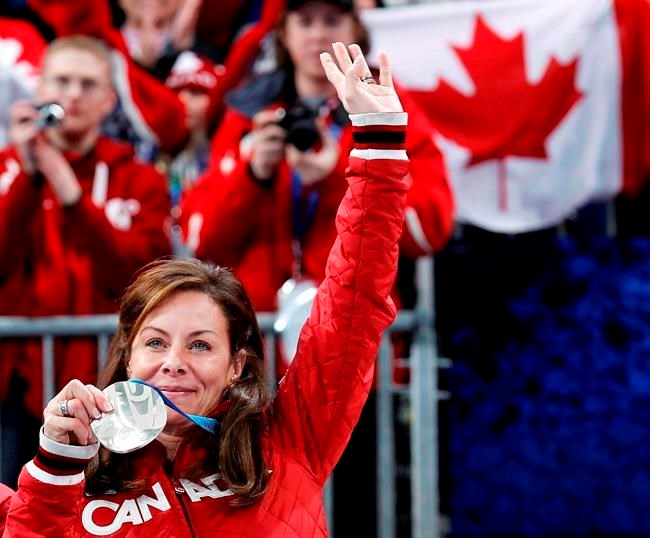Cheryl Bernard looks at Calgary's potential bid for the 2026 Winter Games from both a business and a sport perspective. She built a successful insurance agency in the city before focusing her attention on curling, eventually earning the right to represent Canada at a home Olympics.
"It's a 10-for-1 return and I just don't know that you can say no to something like that in a business sense," Bernard said Thursday, a day after the potential bid survived a city council vote.
Ten votes out of 15 were required to abandon the Nov. 13 plebiscite asking Calgarians if they want to host the Games or not. Only eight voted in favour of the motion, a result that allowed bid supporters to clear a key hurdle.
Now both the yea and nay sides will do their best to beat the drum ahead of the non-binding decision, which will influence the next council vote. The International Olympic Committee will accept 2026 bids in January and the host city will be elected in June.
Bernard spent 13 years in the insurance business after founding a brokerage at age 23. She later skipped Canada to a silver medal at the 2010 Vancouver Games and is now president and chief executive officer of Canada's Sports Hall of Fame.
"I look at this as a business deal," Bernard said from Calgary. "If I was a corporation and somebody was going to say, 'Here, you pay me $390 million and I'll give you $4.4 billion back,' I don't know many businesses that would turn that down."
However, Trevor Tombe, an associate professor with the University of Calgary's department of economics, said he has a problem with the 10-to-1 talking point.
He noted the ratio is not an actual return to the city since a lot of that spending covers expenditures that are not Calgary-specific, such as imported equipment or salaries for security, police and Games staff who are from out of town.
"The 10-to-1 return is incorrect," he said. "It makes it seem as though there is no cost for hosting the Games when the costs are real. The benefits are real too, they're just intangible and something that different people will value in different ways."
Earlier in the week, it did not look like the three levels of government were on the same financial page. But the federal and provincial governments agreed in principle to a revised financial plan from the Calgary 2026 group and it was presented to city council.
The estimated cost of hosting the Games was reduced by $125 million to $5.075 billion and Calgary 2026 dropped the required public investment from $3 billion to $2.875 billion. The Alberta government's commitment remained at $700 million, Ottawa would provide $1.453 billion and the city was asked to contribute $390 million.
Calgary 2026 CEO Mary Moran has called it a "great opportunity" for Calgarians, noting that $4.4 billion of investment could be coming into the community.
"I think (Calgarians) just wanted clear numbers," Bernard said. "That's been the confusion and it's unfortunate it took so long. But what I see now is we've got two weeks. You can see the excitement (now) that people have a clear vision."
Not everyone thinks it would be money well spent.
Franco Terrazzano, the Alberta director of the Canadian Taxpayers Federation, said several arguments can be made for why Calgarians should say no.
"There's three major reasons," he said from Calgary. "The first one is just that no level of government has any money for this, this is going to cost a whole lot of money, and the Olympics is just not a good way to promote economic growth."
Calgary hosted the Winter Olympics in 1988 and several venues could be used again in 2026.
Other cities invited by the IOC to be candidate cities include Stockholm and a joint bid from Milan and Cortina d'Ampezzo, Italy. The IOC has committed $1.2 billion in cash and services to the 2026 host.
"I know we had to see the right numbers but we have those now," Bernard said. "So I hope Calgarians will either look at it as a legacy and an Olympic opportunity or look at it as a great business deal for the city of Calgary."
Bernard, who served as an alternate for Rachel Homan's team at the 2018 Pyeongchang Games, added she still gets choked up when she thinks back to when she competed at a home Olympics.
"I saw people unite," she said. "All of our differences are forgotten when you host something like that. We all come together and we cheer for that one great team.
"It unites our country. Sport has the ability to do that and I don't know many other things that do."
———
Follow @GregoryStrongCP on Twitter.
Gregory Strong, The Canadian Press

